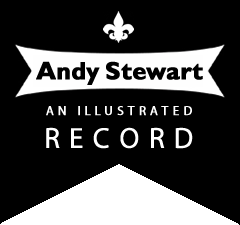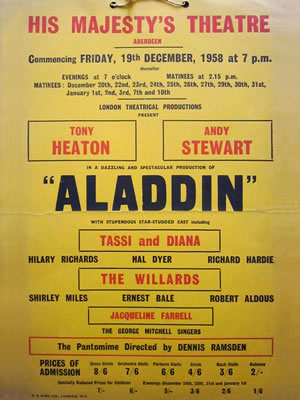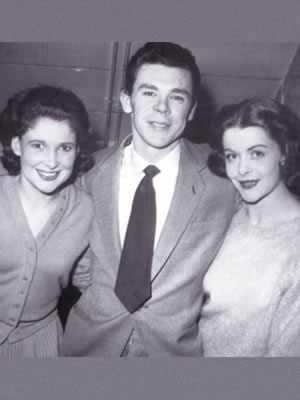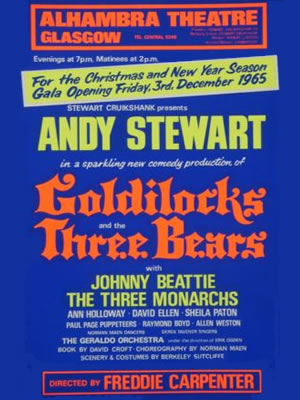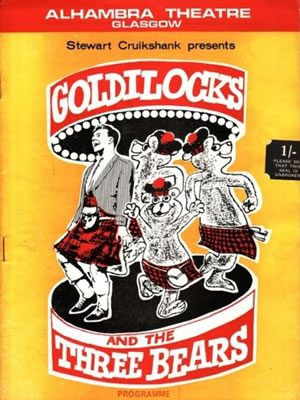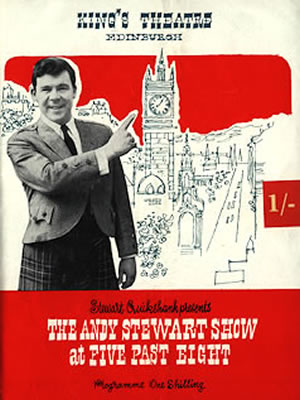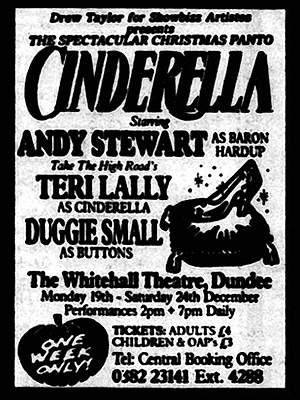“After awhile, the road becomes a way of life but every now and then you get a wee spot of the blues… I’ve missed being at home with my children as they’ve grown up”
More From The Man Behind The Kilt
The 2012 Artworks Scotland production Andy Stewart: The Man Behind the Kilt was a half-hour television programme shown on BBC One Scotland on New Year’s Day 2013 tracing Andy’s career but also endeavouring to dig a little bit deeper, showing another side of the tartan-clad Hogmanay host.
One difficult subject dealt with on the programme was the time that Andy spent on the road, pushing himself to the limits of his mental and physical abilities, repeatedly touring, often abroad, and arguably at the expense of a domestic family life. Folk singer Jimmie Macgregor said in the programme “We all knew that he had been ill for ages and been warned by the doctors to stop touring… and people used to say to me, “Why does he keep doing it?” and I said that’s just who he is, that’s what he is…” Jimmie gave this as his explanation.
During Andy’s lifetime this question was asked more than once and proved to be a question that was difficult to arrive at a definitive answer to. Interviewers offered up various theories. Did he keep up his strenuous workload for financial reasons? Did he need the applause of an audience to feed his ego? Was it a fear of failure that kept pushing him on to do more? Or was it simply the fact that this is what show business entertainers do? Other interviewers cut straight to the quick, asking the question of all questions; did he regret the years spent on the road away from his family? To find out how Andy responded to these questions we need to look back through the archives and find the words of the man himself. Do these reveal more of the character of the man behind the kilt?
The Financial Question
Why would a man work so hard and push himself to the limit, often to the detriment of his health? Armed with the knowledge that the man in question had a wife and six children to provide for, some may answer that this situation alone would be enough to keep any responsible husband and father’s nose to the grindstone. Getting down to pounds shillings and pence, was this simply the reason?
“I used to be driven by the fear of not having enough money. I still think it’s difficult to feel you and your family are financially secure… especially with our rate of inflation. I know it sounds ridiculous, but it is a fear I have had since I started in show business. Perhaps it is caused by the uncertainty of show business itself, where you get instant success followed by immediate failure.
It was this financial fear which drove me to take almost every job which was offered – radio, television, theatre, cabaret, records, and personal appearances. To cope with all the work I was getting up at seven o’clock in the morning and working till almost midnight, six and often seven days a week. It couldn’t last. In 1958 I collapsed from mental and physical exhaustion. I became short-tempered, ungracious and generally anti-social. One night after a show I felt like crying. I was so ill that I just walked into the Western Infirmary and they put me straight to bed. I was in hospital three weeks. When I came out the doctor told me not to work for at least a month. I was back on stage in two weeks.
Even today, when by any standard I suppose I am pretty comfortably off, the feeling persists. The thought is always there that I have Sheila and the children to provide for. I have an accountant, a secretary, the tax man – and a hundred and one other commitments.”
However, even given his apparent fear of financial instability, Andy was in no way naive, and at the height of his career he was absolutely aware that even a mere two week tour could earn him a cool £40,000, so was there something else that drove him on?
Artistic Ego
Comedian Bob Monkhouse once said that “Fame is an addiction – stronger than most.” Many performers have a deep-seated need to feel the appreciation of an audience; the need to be liked. Did Andy have a need to feed his ego?
“It still gives me a great kick to be recognised and be asked for an autograph, or for people to say “You’re Andy Stewart, aren’t you?”
Let’s face it – everyone who goes on stage has to have some kind of ego, but paradoxically you must also have a great deal of humility if you are to establish any kind of rapport between yourself and your audience.
You have to like people and you have to have the feeling of making them want to like you. Show business has been described as two-way traffic and I think you’ve got to keep the traffic going both ways.”
Andy admitted frankly that, at times, he was not always the easiest person to work with. Many driven performers have reputations for being difficult; their passion for doing everything correctly with an attention to detail can see them labelled as “control freaks”. How did Andy respond to criticism?
“I’m accustomed to criticism. After all, when I was a student at the College of Drama in Glasgow, Colin Chandler said I must have a particular talent to be so bad at Shakespeare. I can take criticism if it is constructive and if it comes from someone whose opinion I respect. Mind you I still don’t like it too much!
I will admit I am very opinionated and I do have a short fuse, but normally I am fairly easy-going – as long as I get my own way. If having faith in yourself and your ability is being big-headed, then I suppose I am big-headed. I prefer to call it artistic ego. I have an instinct for knowing what is right or wrong for myself. That is why I like to put on my own shows where I have the final say in what goes on stage. I’ve always tried to keep control of the script and even direction. I suppose this is getting back to my ego again. I’ve always been a rebel; I just don’t like people telling me what to do.
Primarily I do not like to be misrepresented. I had an example of this in a show I did on Harry Lauder. Before the show a critic in a London paper said – “Andy Stewart is giving an impersonation of Harry Lauder. This we feel is like Edward Heath trying to impersonate Winston Churchill.” This is the kind of thing I detest. I was not trying to impersonate Harry Lauder – I was singing the Lauder songs the way I like to sing them. But what is even worse, this was saying I was not fit for the job before I started.”
The Fear of Failure
A cautionary phrase commonly understood and shared amongst artistes in show business is that “you are only as good as your last hit”. Did Andy have a need to prove he could keep delivering the goods? If so, how did he deal with inevitable failures?
“In this business you have to learn to live not only with success but with failure. If you put on the wrong type of show in the wrong type of place you are bound to flop – but the whole world doesn’t come to an end. (For example) I have never felt happy in Pantomime – it does not suit my style of entertainment – I don’t feel comfortable in them. I can only blame myself. I should have known better than to do them.”
During his whole professional career, spanning nearly 40 years, Andy performed in very few Pantomimes. He did three in the 50’s, Dick Whittington (Glasgow – 1955), Cinderella (Edinburgh – 1956) and Aladdin (Aberdeen – 1959) at a time when Andy dare not turn down major offers of work; one at the height of his career, Goldilocks and the Three Bears (Glasgow – 1965) at a time when he could have easily chosen to turn down the offer – but didn’t; Cinderella (Dundee – 1988) and one at the tail end of his career, Robinson Crusoe (Dundee/Portobello/Kelso/Dumfries – 1992) at a time when in all honesty there was probably less work available to him.
Another show Andy considered to be a failure was his appearance in the Five Past Eight Show in Edinburgh in 1965.
“It was an absolute disaster. Everything about it was wrong, including me. I knew it was wrong when we were rehearsing it. It was a rotten show. No deference was being paid to the fact that we were entertaining Scots in the capital of Scotland. The manager was trying to put on this pseudo West-End-of-London show, and it was terrible. We were discussing this when the under-manager said to the boss: “Let’s pander to his ideas and spread a few bits of tartan about the place.” Well, that’s when my fuse blew.
That was not the answer to Scottish entertainment. It has to come from the heart and the mind of the entertainer. I have always believed in keeping it simple. One good three-minute song is worth more than an elaborate set, disappearing orchestra pits, and thousands of pounds worth of lighting. Again I can only blame myself I should have dug my heels in and refused to do it.
The main thing is to learn from your bad performances and work on them until you get your act right. When I was working in a hired dinner suit and trying out my ideas of entertainment they didn’t all work out.
When you hit the bad show the size of your ego drives you on.”
The Absentee Father
Stories of absentee parents are not uncommon in families with an involvement in show business. Children of celebrities will often have tales to tell of seeing their parent more on television than at home.
It is interesting to hear from a contemporary of Andy’s who was able to defend himself on the same subject in the documentary Johnny Beattie: In the Limelight (2012). Beattie’s Daughter Maureen commented to her father on his stage career: “For us as a family you were very absent”, but continued, “…simply because that’s what the job was… When you were up in Aberdeen say, doing a Summer Season, you weren’t getting back home – you couldn’t. That must have been quite hard for you being away from us all?” “Very hard, very hard” Johnny replied, “But that’s one of these things you had to do… Wanting to give you all a good start, a nice home, and all of those things. That was show business…”
“For most of my life I’ve been away more than I’ve been at home – on tour, working on TV shows, in theatres. I’ve been home for two days and away for three. That’s still the pattern even now. It was my decision and I enjoyed my career, but I drove myself very hard.
It was getting to the stage that the only time the kids saw me for months on end was on television. I’ll have to learn to be a father all over again. It hasn’t been easy on Sheila all these years.”
Andy was not unaware then; that the time spent away from home had an effect on his family. But when asked the most difficult of questions; did he regret the long periods on the road? Andy gave a typically stoic answer. However one cannot help but detect from his final comment, that in his quiet times, in a hotel perhaps, alone on the other side of the world, Andy reflected on the price he paid as a showbiz performer.
“Regrets? That’s spilt milk. There’s no point in doing that. No no no no no. If I had only done this or done that… Nobody makes you do what you don’t want to do in this life. Circumstances make people miserable, but we’re more or less masters of our own destiny. Happiness is one of the most elusive things in the world. Show business people are intensely difficult to satisfy, because we are intensely childlike and terribly volatile in our emotions.
After awhile, the road becomes a way of life but every now and then you get a wee spot of the blues… I’ve missed being at home with my children as they’ve grown up… but they all get on well with each other and I’m very proud of them.”
Perhaps Jimmy Logan summed up Andy’s character most succinctly: “He was his own man, he chose his own road and no-one could have stopped him.”
The Man Behind The Kilt (BBC 2012)
PLAY (YOUTUBE)
